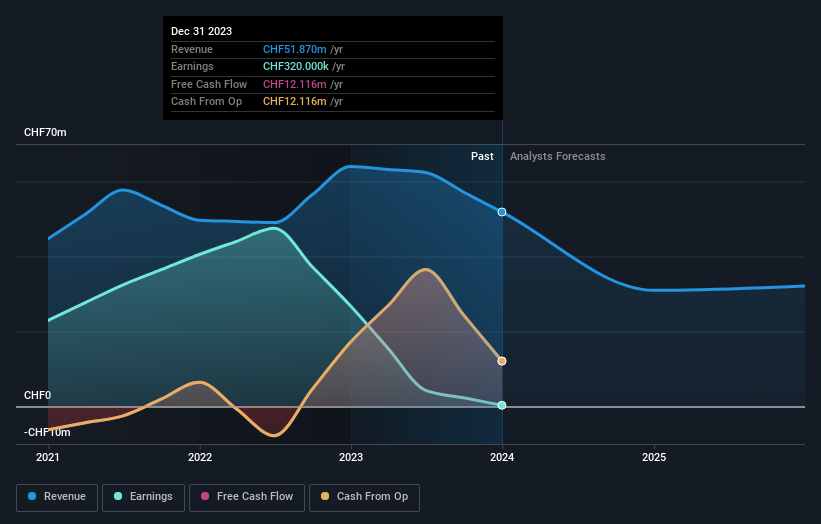SF Urban Properties AG (VTX:SFPN) most popular amongst individual investors who own 55% of the shares, institutions hold 27%
Key Insights
Significant control over SF Urban Properties by individual investors implies that the general public has more power to influence management and governance-related decisions
A total of 19 investors have a majority stake in the company with 45% ownership
A look at the shareholders of SF Urban Properties AG (VTX:SFPN) can tell us which group is most powerful. And the group that holds the biggest piece of the pie are individual investors with 55% ownership. Put another way, the group faces the maximum upside potential (or downside risk).
And institutions on the other hand have a 27% ownership in the company. Large companies usually have institutions as shareholders, and we usually see insiders owning shares in smaller companies.
Let's delve deeper into each type of owner of SF Urban Properties, beginning with the chart below.
Check out our latest analysis for SF Urban Properties
What Does The Institutional Ownership Tell Us About SF Urban Properties?
Institutional investors commonly compare their own returns to the returns of a commonly followed index. So they generally do consider buying larger companies that are included in the relevant benchmark index.
SF Urban Properties already has institutions on the share registry. Indeed, they own a respectable stake in the company. This can indicate that the company has a certain degree of credibility in the investment community. However, it is best to be wary of relying on the supposed validation that comes with institutional investors. They too, get it wrong sometimes. When multiple institutions own a stock, there's always a risk that they are in a 'crowded trade'. When such a trade goes wrong, multiple parties may compete to sell stock fast. This risk is higher in a company without a history of growth. You can see SF Urban Properties' historic earnings and revenue below, but keep in mind there's always more to the story.
SF Urban Properties is not owned by hedge funds. Our data suggests that Hans-Peter Bauer, who is also the company's Top Key Executive, holds the most number of shares at 19%. When an insider holds a sizeable amount of a company's stock, investors consider it as a positive sign because it suggests that insiders are willing to have their wealth tied up in the future of the company. In comparison, the second and third largest shareholders hold about 17% and 5.0% of the stock.
A deeper look at our ownership data shows that the top 19 shareholders collectively hold less than half of the register, suggesting a large group of small holders where no single shareholder has a majority.
While it makes sense to study institutional ownership data for a company, it also makes sense to study analyst sentiments to know which way the wind is blowing. There is a little analyst coverage of the stock, but not much. So there is room for it to gain more coverage.
Insider Ownership Of SF Urban Properties
While the precise definition of an insider can be subjective, almost everyone considers board members to be insiders. Management ultimately answers to the board. However, it is not uncommon for managers to be executive board members, especially if they are a founder or the CEO.
I generally consider insider ownership to be a good thing. However, on some occasions it makes it more difficult for other shareholders to hold the board accountable for decisions.
It seems insiders own a significant proportion of SF Urban Properties AG. It has a market capitalization of just CHF302m, and insiders have CHF57m worth of shares in their own names. It is great to see insiders so invested in the business. It might be worth checking if those insiders have been buying recently.
General Public Ownership
The general public -- including retail investors -- own 55% of SF Urban Properties. This size of ownership gives investors from the general public some collective power. They can and probably do influence decisions on executive compensation, dividend policies and proposed business acquisitions.
Next Steps:
While it is well worth considering the different groups that own a company, there are other factors that are even more important. Like risks, for instance. Every company has them, and we've spotted 4 warning signs for SF Urban Properties (of which 2 are a bit concerning!) you should know about.
But ultimately it is the future, not the past, that will determine how well the owners of this business will do. Therefore we think it advisable to take a look at this free report showing whether analysts are predicting a brighter future.
NB: Figures in this article are calculated using data from the last twelve months, which refer to the 12-month period ending on the last date of the month the financial statement is dated. This may not be consistent with full year annual report figures.
Have feedback on this article? Concerned about the content? Get in touch with us directly. Alternatively, email editorial-team (at) simplywallst.com.
This article by Simply Wall St is general in nature. We provide commentary based on historical data and analyst forecasts only using an unbiased methodology and our articles are not intended to be financial advice. It does not constitute a recommendation to buy or sell any stock, and does not take account of your objectives, or your financial situation. We aim to bring you long-term focused analysis driven by fundamental data. Note that our analysis may not factor in the latest price-sensitive company announcements or qualitative material. Simply Wall St has no position in any stocks mentioned.
Have feedback on this article? Concerned about the content? Get in touch with us directly. Alternatively, email editorial-team@simplywallst.com

 Yahoo Finance
Yahoo Finance 

